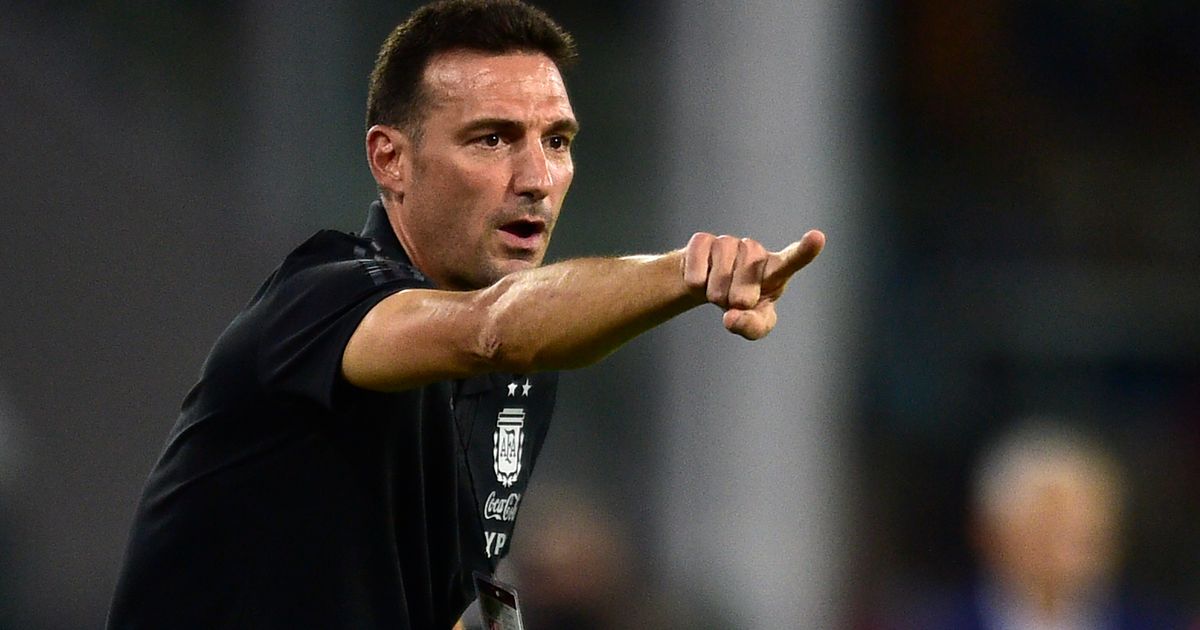
BUENOS AIRES, Argentina (AP) — The quiet Russian town of Bronnitsy was the scene of one of the most tense moments the Argentina team experienced during the 2018 World Cup when Lionel Messi stood up to the then-coach Jorge Sampaoli and yelled: “We don’t get what you’re saying. We no longer trust you. We want to have an opinion.”
Lionel Scaloni, who was a member of the team’s technical staff at the time, witnessed the confrontation that laid bare the insurmountable differences between Sampaoli and the players before Argentina was eliminated in the round of 16 by France. Details of the confrontation started trickling out over the next few days, and Sampaoli was soon gone.
Scaloni’s surprising success leading Argentina — even though he didn’t have much of a record as a coach, he was able to break a streak of 28 years without a title and set a record of 35 undefeated matches — had a lot to do with that confrontation outside Moscow.
“I never worried about sitting in front of a group and speaking honestly, plainly. You can lie to them once, but the second time they call you out,” the 44-year-old coach said in a recent interview. “It’s important that when the players go out into the field they’re convinced of what the coach says. I think we’ve been able to achieve that.”
Since 1993, when Argentina had won its last trophy, coaches with lots of experience, such as Daniel Passarella, Marcelo Bielsa, Alejandro Sabella, Gerardo Martino and Sampaoli himself, left without glory. Even a symbol of the national team like Diego Maradona struck out.
The original plan after the 2018 World Cup was for Scaloni to lead the team in two friendly matches in the United States while the Argentine soccer association negotiated with a more experienced coach. But the main candidates — Mauricio Pochettino (who was with Tottenham at the time), Diego Simeone (Atlético de Madrid) and Marcelo Gallardo (River Plate) — were all busy and the federation was not willing to break another contract, as it had done with Sampaoli and Sevilla in 2017.
With a thin resumé that included only a few practices under his belt as an under-17 coach in Mallorca, Spain, where he lives, and as Samapoli’s assistant, Scaloni leaned on his own experience as a player in the national team.
A former right back, Scaloni emerged from Newell’s Old Boys in Rosario — just like Messi — and then transferred to Estudiantes de La Plata. After he was part of the winning team at the 1997 World Youth Championship in Malaysia, he started a tour through European clubs, first at Deportivo de La Coruña in Spain, then West Ham in England, Racing Santander back in Spain, and Lazio and Atalanta in Italy.
He played with the Argentine national team at the 2006 World Cup.
“He’s a very smart person. He was always one to watch and ask a lot of questions,” Hugo Tocalli, the coach of Argentina’s youth squads from 1994-2007 and field assistant to José Pekerman at the 2006 World Cup, told The Associated Press. “He wanted to know the reasons behind certain tactical exercise, why a certain team was chosen. He was also one to talk a lot with his colleagues.
“He has applied that now, how to talk to the players. As a coach he makes things simple and has gained the respect of the players.”
As coach of the Albiceleste, Scaloni shaped a team that was made up by the survivors of the group that reached the finals at the 2014 World Cup and the 2015 and 2016 Copa America — Messi, Ángel Di María, Nicolás Otamendi — and new talents, such as Emiliano Martínez, Cristian Romero, Leandro Paredes and Rodrigo De Paul.
Scaloni also managed to obtain the best version of Messi in the national team. As opposed to his predecessors, who insisted on replicating his style of play at Barcelona when he played for Argentina, Scaloni called on three midfielders — Paredes, De Paul and Giovanni Lo Celso — to liberate Messi from a leadership role and play closer to the area.
“He deserves everything he lived through as well, because the process he had to grasp was not easy and he built all of this,” said Messi, who won the first trophy of his career with the national team at the 2021 Copa America.
“He’s very personable, talks a lot with the players and tries to be there for whatever is needed,” added Messi, Argentina’s top scorer with 90 goals in 165 matches. “It’s evident … he loves what he does.”
After the initial criticism from the media and disapproval from more experienced colleagues who did not think he was qualified enough to lead a team like Argentina, Scaloni is now asking for caution as the World Cup approaches when faced with the euphoria behind the “Scaloneta,” as his team has been nicknamed.
“We’re going to try to do the best job possible, there’s no doubt about that,” said Scaloni, who had renewed his contract until 2026. “Then if it goes well, perfect, but if it goes poorly, it isn’t all bad. That’s the message because that way we will play more calmly.”
___
AP World Cup coverage: https://apnews.com/hub/world-cup and https://twitter.com/AP_Sports